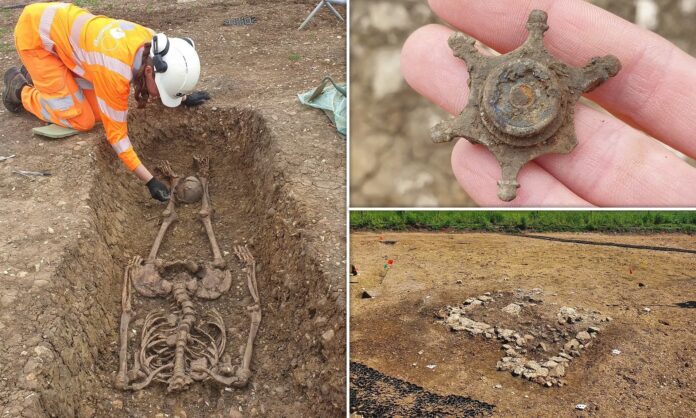Ancient Cemetery Reveals Fascinating Insights into Late Roman Britain
A Grim Discovery with Historical Significance

In a remarkable archaeological find, the HS2 high-speed rail project has uncovered a late Roman cemetery containing 425 skeletons near Aylesbury, Buckinghamshire. This discovery, made by a team of 50 archaeologists working for over a year, has shed new light on burial practices and life in Roman Britain.
Decapitation: A “Normal, Albeit Marginal” Practice

Among the most intriguing aspects of this find is that approximately 10% of the bodies were decapitated, with some heads placed between the legs or near the feet. While this may seem gruesome by modern standards, HS2 Ltd suggests that decapitation was a “normal, albeit marginal” burial practice in the late Roman period, around 410 AD. These individuals may have been criminals or outcasts, though the exact reasons remain a mystery.
A Thriving Community Revealed

The excavation at Fleet Marston has yielded more than just human remains. Over 1,200 coins were discovered, indicating a bustling center of trade and commerce. Everyday objects such as spoons, pins, and brooches provide glimpses into daily life, while gaming dice and bells suggest leisure activities and religious practices were important to the community.
Significance for Roman Buckinghamshire

Richard Brown, senior project manager for the excavation, emphasized the importance of this discovery in characterizing the Roman town and its inhabitants. Combined with other Roman settlements found during the HS2 works, this find significantly enhances our understanding of Roman Buckinghamshire.
Ongoing Research and Future Insights

As one of more than 100 archaeological sites examined by HS2 since 2018, Fleet Marston promises to offer valuable insights into life in Roman Britain. The excavated remains are now being carefully analyzed, potentially revealing more secrets about this ancient community and its place in history.

